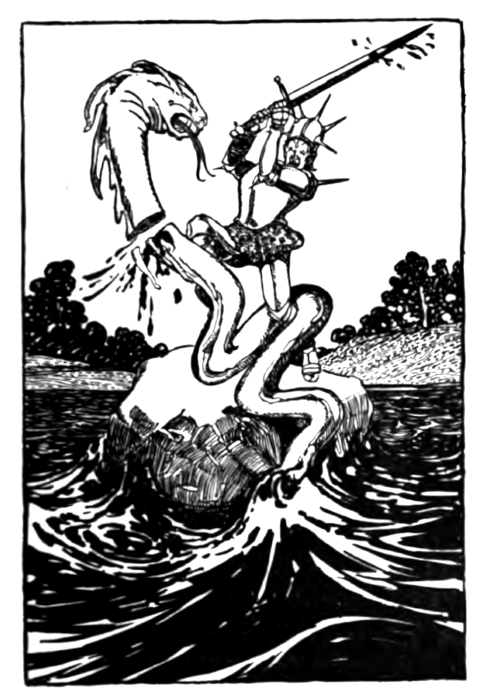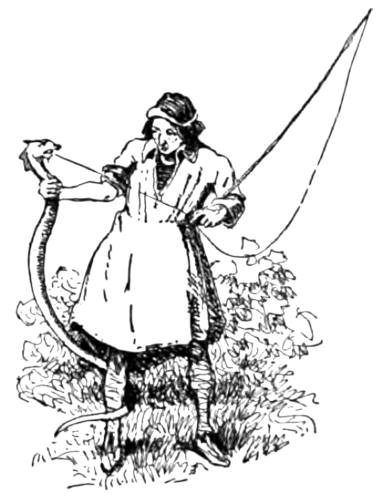| Web
and Book design,
Copyright, Kellscraft Studio 1999-2024
(Return
to Web
Text-ures)
| Click
Here to return to The Elm Tree Fairy Book Content Page Return to the Previous Chapter |
 (HOME)
|
|
THE
LAMBTON WORM
One Sunday morning, when he was engaged in fishing as usual,
he for a considerable time paced up and down the shore of a river that flowed
along near the highway, without getting a single fish. The longer this ill-luck
continued, the worse grew his language, and the people passing on their way to
church were horrified at his words. He pulled and he pulled, and it was only with the greatest
exertion that he landed his prize. Then, to his disgust, he saw that it was no
fish, but a great, ugly worm, fully a yard long, and with a curious,
wide-mouthed head. He removed it from the hook and holding it off at arm's
length began swearing at it, when he was surprised to hear it speak. "Let
me go," the worm said. "Put me back in the river." "No, I will not!" exclaimed young Lambton. "You had no business to get on my hook, and you shall
be punished." "You will regret it if you do not put me back in the
stream," responded the worm. But the young man strode up the bank to an old well near by
and threw the worm into that. Then he went home, and not many days afterward he
departed to the wars in the Holy Land. The worm did not die in the well. It grew larger and larger
until it was so big the well would not contain it. So it crawled forth and
returned to the river where it continued to increase in size till its length
was twenty rods or more. All day it lay coiled round a rock in the middle of
the stream, but at night it betook itself to the land, where it sucked the milk
from the pasturing cows, devoured lambs and frightened the people who chanced
to see it. At last it grew so bold it would come right up to Lambton Hall,
where the old Lord of Lambton now lived with none to keep him company but the
servants. He ordered that the worm should be driven away. The men gathered
weapons, and there was shrieking of women, barking of dogs and the terrified
neighing of horses; but when all was ready, the worm looked so big and powerful
no one durst approach it. As they stood watching the creature from a safe
distance, the steward said, "Is it not plain that the worm only comes here
seeking something to eat? If we give it food it will do us no harm." So he called the dairy maids and said, "Bring hither
all the milk you got this day from the nine cows in the lord's stable." This they did, and he had them pour it into a long stone
trough that was in the courtyard. They had scarcely finished when the worm
sniffed the milk and came to the trough. It soon swallowed every drop and then
slowly crawled away. Henceforth, the worm came from the river every night to the
stone trough at the Hall, and if the trough contained less than the milk of
nine cows, the worm was very angry. It would hiss and rave and lash itself
among the trees of the park, and in its fury would uproot the stoutest oaks.  The combat with the worm Thus things went on for seven years. Many a knight came and
fought the worm and lost his life in attempting to destroy the monster.
Sometimes a knight would succeed in cutting the worm in two, yet the parts
would immediately unite, and in the end the valiant assailant would be caught
and crushed. At length the heir of Lambton returned from the wars. He had
repented of his former sins and was a very different person from what he had
been when he left home. He was much distressed to see the broad lands of his
ancestors laid waste and desolate. The fields were untilled, the farms were
deserted, and half the trees in the park were uprooted. He hastened to the
mansion and received the embraces of his aged father, who was nearly worn out
with sorrow for the absence of the son and for the destruction wrought on his
fair domain by the worm. As soon as the greetings were over, the heir of Lambton went
to the river to view the monster where it lay in midstream coiled around the
rock. "I have been the cause of all the misery which has been brought on
the country roundabout," said he, "and I will slay this great worm or
perish in the attempt." To protect himself as well as he could from the worm when it
should attempt to coil about him and crush him, he sought a blacksmith and had
his armor studded with spear points. Then he waited till night and went to the
worm's rock to take his station and watch for the creature's return. At dawn he
saw the worm coming, and he unsheathed his trusty sword which had never failed
him. When the worm reached the rock, the knight struck it on the
head with his sword, but the only effect was to rouse the monster's anger. It
lashed the water in its fury, and, closing on the knight, clasped its frightful
coils around him and endeavored to strangle him. But the more it pressed the
deeper the spear points of the knight's armor dug into its sides. The strength
of the worm diminished as its efforts to destroy the knight increased, and at
last, seizing a favorable opportunity, he made such good use of his sword that
he cut the monster in two. The tail part was immediately carried away by the
current so that the worm was unable to reunite itself. The conflict went on, but finally the worm was destroyed by the courageous knight. Then he swam to shore, and raising his bugle to his lips blew a three-fold blast as a signal of victory. The household at the Hall had been devoutly engaged in prayer during the combat, and they now hastened to welcome the triumphant warrior. There was rejoicing throughout the region, and the Lambton estate in time regained its former prosperity. |
 LAMBTON HALL was a fine old country mansion, and connected
with it there was a rich estate. Many families lived and worked on the estate,
and they felt great anxiety because the heir of Lambton was a wild young fellow
who cared neither for law nor religion. On Sunday, instead of attending church,
it was his habit to go fishing, and if he failed to be successful in his
Sabbath sport loud and many were his curses.
LAMBTON HALL was a fine old country mansion, and connected
with it there was a rich estate. Many families lived and worked on the estate,
and they felt great anxiety because the heir of Lambton was a wild young fellow
who cared neither for law nor religion. On Sunday, instead of attending church,
it was his habit to go fishing, and if he failed to be successful in his
Sabbath sport loud and many were his curses.